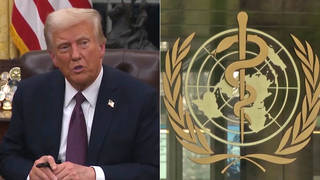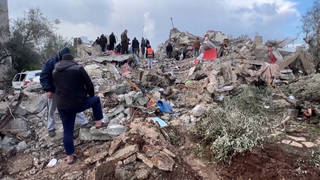HeadlinesApril 11, 2011
One Month After Quake, Japan Expands Evacuation Zone, Tens of Thousands Dead, Missing
Japan has expanded the evacuation zone around its crippled Fukushima Daiichi nuclear power plant because of high levels of accumulated radiation. The move was announced today one month after the massive earthquake and tsunami left more than 28,000 people dead or missing and sparked the worst nuclear crisis since Chernobyl. Some 151,000 Japanese are still living in shelters. On Sunday, more than 10,000 people took part in anti-nuclear protests in Tokyo.
Shigeki Okuno, student demonstrator: “We demand that the Kan government stop pumping radioactive water into the sea from the Fukushima Daiichi nuclear reactor, stop withholding information. We are marching to prevent residents of Fukushima from further radioactive contamination.”
President Obama to Announce Deficit Plan, Healthcare Cuts, Tax Increases for Wealthy
President Barack Obama is preparing to give a major address Wednesday to outline his long-term plan for deficit reduction. He is expected to propose cuts to Medicare and Medicaid and changes to Social Security. Senior White House adviser David Plouffe appeared on Meet the Press Sunday and said Obama will also call for tax increases on the wealthy.
David Plouffe, a senior White House adviser: “[The President] has said that he believes taxes on the higher income—people over $250,000—should eventually go up.”
David Gregory: “Can you tackle the deficit without raising taxes on even the middle class?”
Plouffe: “I think the President’s goal — and he’s been clear about this — is to protect the middle class as we move forward here. So, people like him, as he’ll say, who have been very fortunate in life, have the ability to pay a little bit more.”
Lawmakers Reach Budget Deal, $38 Billion Cut
On Friday, the White House and congressional leaders reached a last-minute deal to cut $38 billion in spending for the final six months of this fiscal year. The deal—which still needs to be voted on by Congress—prevented a government shutdown, but larger budget battles are on the horizon.
Libya: NATO Increases Attacks on Gaddafi Forces, African Leaders Seek Peace Deal
In Libya, NATO forces are intensifying its attacks on ground forces loyal to Col. Muammar Gaddafi in an effort to help the poorly trained anti-Gaddafi rebel forces hold their ground. NATO has set up a system to allow rebel commanders call in air strikes. Meanwhile, leaders from the African Union traveled to Libya this weekend. South African President Jacob Zuma announced the Libyan government has accepted the African Union peace plan, but details of the plan were not released. Rebel fighters have said they will not support any ceasefire that leaves Gaddafi in power.
Syrian Security Forces Clash with Protesters, Dozens Killed
It has been a deadly weekend across the Middle East as authorities continue to use violence to crush the popular uprisings. In Syria, human rights groups are reporting at least 37 demonstrators died Friday in clashes with security forces. More than 20,000 marched in the Syrian city of Daraa on Friday. Unconfirmed reports indicate one Syrian security official and four civilians were killed in clashes in the city of Banias on Sunday.
Egypt Army Soldiers Attack Tahrir Square Killing Two Protesters
In Egypt, soldiers attacked a large protest in Tahrir Square on Friday, killing two protesters and injuring dozens. Protesters told Amnesty International the army used sticks, electric batons, shot in the air, and drove armored vehicles into the protest, causing a number of injuries. Dozens of protesters were also arrested and may face a military trial. The protesters were calling for the trial of former president Hosni Mubarak and other officials. On Sunday, Mubarak issued his first public remarks since being ousted on Feb. 11. In an audio message broadcast on Al Arabiya television, Mubarak threatened to sue those who undermined his public image.
Former Egyptian President Hosni Mubarak: “I have been, and still am, pained by what I and my family are facing from fraudulent campaigns and unfounded allegations that seek to harm my reputation, my integrity and my military and political record.”
Bahrain: Police Raid Home of Prominent Human Rights Activist
In the Gulf nation of Bahrain, masked police officers raided the home of Abdulhadi Alkhawaja, a prominent Bahraini human rights activist. His daughter said the officers dragged him down the stairs and started beating him. Meanwhile, the president of Bahrain’s Center for Human Rights, Nabeel Rajab, is facing a possible military trial for publishing the photograph of a protester who died in custody.
United Arab Emirates Detains Three Activists
In the United Arab Emirates, three rights activists have been detained in recent days. The arrested include Ahmed Mansoor, a prominent blogger in Dubai who was recently elected to the UAE parliament.
Ivory Coast: Helicopters Strike Gbagbo Residence, Ouattara Forces Accused of Atrocities
In news from Africa, U.N. and French helicopters have opened fire on the residence of Ivory Coast incumbent President Laurent Gbagbo. U.N. Secretary-General Ban Ki-moon said he ordered forces to “use all means necessary” to neutralize Gbagbo’s heavy weapons. Sunday’s strikes came after Gbagbo’s forces fired on the hotel headquarters of President-elect Alassane Ouattara. Meanwhile, forces loyal to Ouattara are coming under criticism for atrocities allegedly committed during their advance on the city of Abidjan. According to Human Rights Watch, the pro-Ouattara forces killed hundreds of civilians, raped more than 20 alleged supporters of Gbagbo, and burned at least 10 villages. The allegations add to a growing humanitarian crisis in the region. Jean-Philippe Chauzy is a spokesperson for the International Organization for Migration.
Jean-Philippe Chauzy: “The humanitarian challenges remain enormous. Access to drinkable water remains the major challenge, many of the wells actually polluted. Water is unsafe for drinking. Access to sanitation is very, very limited.”
Israel Cracks Down on Gaza, 19 Killed
At least 19 Palestinians have died in Gaza since Thursday in the deadliest series of Israeli attacks since the end of the Israeli assault on Gaza two years ago. Israel launched the strikes after Palestinian militants fired an anti-tank rocket that hit an Israeli school bus, critically wounding a teenager.
Iraqis Protest After U.S. Official Suggests Troops Could Remain in Country
Thousands of people protested across Iraq on Saturday one day after U.S. Secretary of Defense Robert Gates said U.S. troops could remain in Iraq for years to come. The prominent Shiite cleric, Muqtada al-Sadr, threatened to return to armed resistance if U.S. troops stay in Iraq beyond this year. Salah al-Ubaidi, a spokesperson for al-Sadr, addressed a large crowd on Saturday, which marked the eighth anniversary of the fall of Baghdad to U.S. forces.
Salah al-Ubaidi, spokesman of Shiite cleric Muqtada Al-Sadr: “His Eminence Muqtada al-Sadr said that work should be different, in case they breach, in case they do not leave our country. That means two things: firstly, escalating military opposition and reinstating the Mahdi army, which will be in a new declaration issued later; secondly, escalating peaceful and popular opposition through sit-ins, confirming that the people call for the occupiers to leave.”
U.S. Admits Running Secret Jails in Afghanistan
In news from Afghanistan, the U.S. military has admitted the Joint Special Operations Command is running 20 secret jails across Afghanistan where prisoners can be interrogated for weeks without charge. The existence of the secret prisons was confirmed by U.S. military officials during interviews with the Associated Press. The Pentagon has previously denied operating secret jails in Afghanistan, although human rights groups and former detainees have described the facilities.
Worldwide Military Spending Reaches Record High
Despite the global economic downturn, worldwide military spending reached a new record of $1.6 trillion in 2010, according to the Stockholm International Peace Research Institute. The Unites States increased spending by 2.8 percent to nearly $700 billion—about six times as much as China, the second-biggest spender.
Leftist Wins First Round of Peru Presidential Elections
Voters in Peru went to the polls Sunday to pick a successor to President Alan García. Leftist Ollanta Humala won the first round of the election. Exit polls show lawmaker Keiko Fujimori placed second. She is the daughter of former right-wing Peruvian President Alberto Fujimori, who is now in prison for human rights abuses. The two will face each other in a runoff election on June 5.
Indian Activist Ends Hunger Strike, Government Moves to Enact Anti-Corruption Bill
In India, the social justice activist Anna Hazare has ended a hunger fast after the Indian government said it would move towards enacting a strong anti-corruption bill. Hazare called for an independent ombudsman with police-like powers to prosecute ministers, bureaucrats and judges. Hazare’s campaign has drawn comparisons to Mahatma Gandhi’s protests and hunger strikes that helped end British colonial rule. The 70-year-old activist spoke on Saturday after declaring victory.
Indian activist, Anna Hazare: “Our three or four members of the committee have taken the draft to the government, and I will call off my fast when that draft comes back. Arvind Kejriwal will let you know what was discussed there. Because the government has accepted our demands, I believe that this is a victory for Indian democracy.”
Wisconsin Supreme Court Race Headed for Recount amid Calls for Investigation
The closely watched Wisconsin Supreme Court justice race appears headed for a recount as more votes have been found for conservative Supreme Court Justice David Prosser, giving him a growing lead over progressive challenger JoAnne Kloppenburg. Democratic Congresswoman Tammy Baldwin has requested U.S. Attorney General Eric Holder investigate the surprise discovery of 14,000 votes for Prosser.
Thousands Protest Washington State Budget Plan
Home care workers, immigrants and union members were among the thousands of demonstrators who gathered in Olympia, Washington, Friday to protest a new state budget plan and corporate tax breaks. On Saturday, the Washington State House of Representatives passed a budget bill slashing $4.4 billion from state programs. The new budget cuts $485 million from higher education and another $216 million from programs aimed at reducing class size for young students. More than a dozen protesters were arrested last Thursday after trying to storm the office of Gov. Chris Gregoire.
Dozens Arrested at White House School of the Americas Protest
Twenty-seven human rights activists were arrested in front of the White House on Sunday when they staged a die-in calling for the closing of the U.S. Army’s School of the Americas, now known as the Western Hemisphere Institute for Security Cooperation.
Most popular
- 1
- 2
- 3
- 4
Non-commercial news needs your support
Please do your part today.











Media Options